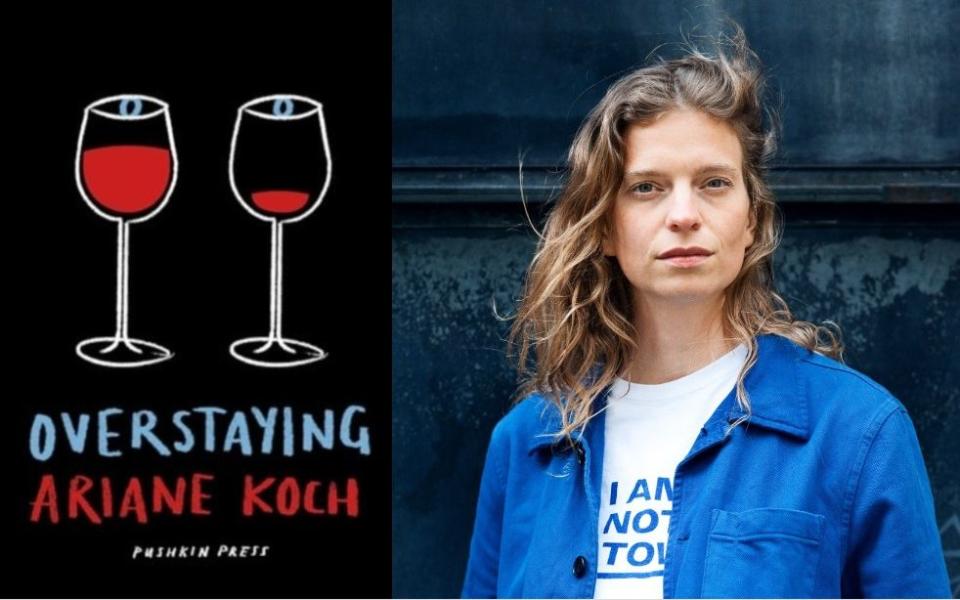How do you deal with a house-guest who eats your socks?

An unnamed narrator in an unnamed small town – possibly in Eastern Europe – takes in a destitute wanderer on a whim. The narrator’s 10-roomed house is the largest in the town; she inherited it from her parents. She lives in fear of being unceremoniously turfed out by her brothers and sisters, who, having multiplied and followed all the rules of a normal successful life, generally feel the property is owed to them.
In the wonderfully controlled mise en scène of Overstaying, the debut novel by the Swiss writer Ariane Koch, the action rotates between this house, her local pub/café, the Roundel Bar, and a snowcapped mountain that looms over everything. When the narrator first meets her guest-to-be in the Roundel, they perform a strange dance, and exchange information despite having no language in common. Then, without any direct request being made, she accepts him into her home.
In Koch’s succinct chapters – most are barely longer than a page – the fault lines quickly emerge, and with them an immediate comedy of contrast. The narrator is almost vaporously preoccupied; the visitor irritates her with his odd singing and giant dictionaries. At first, he howls at night and sleeps outside her door; he becomes, for a time, her servant. She experiments by withholding food, and not letting him speak, and takes a sadistic pleasure in entertaining her worst impulses. But, gradually, the visitor gets the upper hand: not only does he eat her socks, but he attracts other curious people and holds lavish parties in her house. The narrator shrinks further into herself; she finds that she can’t let him go.
Overstaying becomes a bizarre and beautiful psychodrama about hospitality, control and domination. “Something’s not quite right about the visitor,” the narrator thinks. “That is to say, I know for certain that nothing is right about him. That nothing either suits him or matches the rest, that he’s a collection of puzzle pieces from different puzzles.” That Koch’s novel seems to take place half in the “real world” and half in a Leonora Carrington painting is not so much a distraction as essential to the composition: the balanced exaggerations that transfigure reportage into literature.
There is a tendency to praise the originality, experimentality and strangeness of novels such as this, but the fact is that they belong – knowingly, and to their credit – to a long-established European tradition: the Dostoevsky of Notes from Underground, the Kafka of the oblique short stories. Erudition and intelligence are turned against themselves; reduced circumstances become a hymn to rugged individualism. It’s a lineage anyone who has a glancing acquaintance with their Penguin Classics can appreciate.

Novels like this aren’t about plot, per se, but Koch establishes such an engaging offbeat dynamic, and ends each short chapter on such a deliciously provocative lyrical flourish – aided by Damion Searls’s supple translation from the German – that you race through, desperate to find out the next small act of cruelty or indignity. And, alongside that, we receive the narrator’s reflections on her past, on her superstitiously religious grandfather, on her radically emotionally absent parents, on her first loves; all concessions to the novelist’s duty of exploring just how we turn out the way we do. “I remember my parents’ polite looks when I was a child showing them something… just waiting for me, the youngest, to grow up so they could go away.”
Just as they’re not primarily about plot or in-depth character study, novels like this are refreshingly free from messages or issues. Yet, at the same time, something else is going on in Overstaying, something bigger. It seems that the town is in danger of being reduced to rubble in an unnamed conflict, and that the narrator and her entire “people” are on the cusp of being displaced themselves, taken in by a neighbouring country, made dependent on its tactical generosity, fitful largesse and not-quite-right cuisine. None of this is more than hinted at by a passing fighter jet or vague references to a news report: it’s kept almost entirely out of shot.
Overstaying is a joy to read. It’s tautly written, caustically witty, and replete with imaginative insights. I’m already excited to read Koch’s second book; she is so perceptive, convincing and poised a writer that it makes you feel grateful that such a talent shares your world.
Overstaying, tr Damion Searls, is published by Pushkin at £10.99. To order your copy for £9.99, call 0808 196 6794 or visit Telegraph Books

